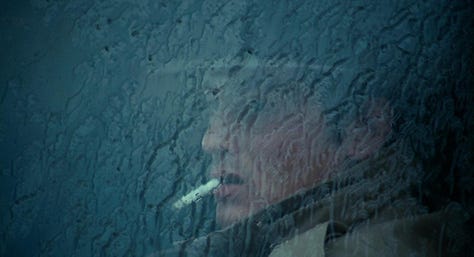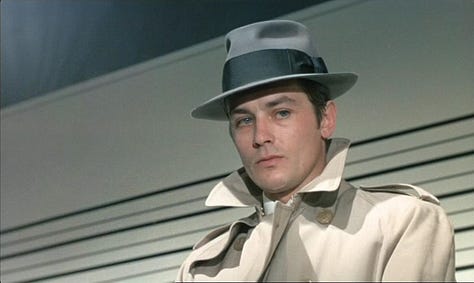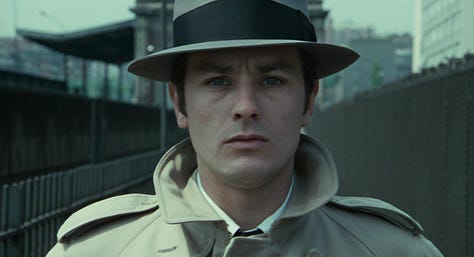LE SAMOURAÏ
1967 • Jean-Pierre MelvilleScreenplay: Jean-Pierre Melville, Georges Pellegrin
Producers: Raymond Borderie, Eugène Lépicier
Cast: Alain Delon, François Périer, Nathalie Delon, Cathy Rosier
Cinematography: Henri Decaë
Music: François de RoubaixS.N. Prodis
I never lose. Never really.
Le Samouraï follows a stoic and meticulous hitman named Jef Costello, portrayed by Alain Delon, as he navigates a complex web of deception and danger in the criminal underworld of Paris. With its minimalist style, evocative cinematography, and a focus on the protagonist's enigmatic persona, the movie is revered for its contribution to the neo-noir genre.
Costello is the perfect hitman. Costello meticulously plans his assassinations out to every detail and he never, ever gets caught. One night, however, he’s seen by witnesses after offing a nightclub owner. Suddenly, the people who paid him off as well as his alibi all betray him and he’s driven into a corner trying to escape.
Melville had a significant history of resistance against the Nazis during World War II. Melville's experiences in the Resistance had a profound impact on his filmmaking style and themes. His time in the underground network instilled in him a sense of discipline, secrecy, and the constant need to navigate danger, all of which are evident in this film. The atmosphere of tension and moral ambiguity permeates Samouraï.
The crime films of the 40s seemed to have had quite the effect on Melville as this movie is clearly inspired by those noir classics. Pay attention. It’s a film about a hitman, but there is very little in the way of “action.” There are no gunfights and no overly choreographed fight scenes. There is killing, violence, and a chase sequence, yes, but they are there to serve the story, much like the noir films of the 40s. The film relies on 2 major things to tell the story: Melville’s camera work and Alain Delon’s acting. He barely speaks in the film, but his acting is so spot-on that you know exactly what Jef Costello is thinking purely through body language. After all, he essentially only has 2 facial expressions in the whole movie. This works as a character device, because, after all this guy is a stone-cold killer… he wouldn’t show much expression anyway. He’s also the fastest draw on a gun that you’ll see in pretty much any film. If you don’t walk away from this film without thinking that Jef Costello is one of the coolest characters of all time, then there is no hope for you.
However, Costello embodies the archetype of an anti-hero rather than a conventional hero. Operating as a meticulous hitman, Jef displays a detached and emotionless demeanor, devoid of moral qualms or sentimentality. His profession and code of conduct place him outside the boundaries of conventional morality, making him an outsider in society. Despite his criminal pursuits, his unwavering adherence to his own code and his stoic determination to survive create a complex and conflicted character that defies easy categorization as either purely heroic or villainous.
The camera work is brilliant, a masterclass in minimalist yet evocative cinematography. Melville's use of long, static shots and deliberate framing captures the essence of the characters' isolation and detachment from the world around them. The careful manipulation of light and shadows accentuates the film's neo-noir atmosphere, enhancing the enigmatic persona of Costello. Melville knows exactly where to put the camera to convey intrigue, suspense, etc. The dialogue is almost non-existent, so everything is achieved mostly through camera work. That is a rare accomplishment: Minimalist filmmaking that produces a film with maximum entertainment value.
Le Samouraï stands as one of the finest hitman movies due to its unparalleled ability to delve into the psyche of its protagonist, Jef Costello, portrayed by Alain Delon. The film's minimalistic style, intense focus on character-driven tension, and meticulous attention to detail create an immersive experience that ranks it among the top tier of the genre.
- Who are you?
- Doesn't matter.
- What do you want?
- To kill you.
Notable Accomplishments
Ranked #39 on Empire's list of The 100 Best Films of World Cinema
Turkish Film Critics Association: Nominee for Best Foreign Film
Heavily influenced films by Walter Hill, John Woo and Jim Jarmusch
Streaming: MAX, Roku, Criterion Channel, Kanopy
Digital Rental/Purchase: Amazon, Google, YouTube, Vudu, Apple TV
Physical Media: Available on Blu-Ray and DVD. Part of the Criterion Collection












I need to see this again!